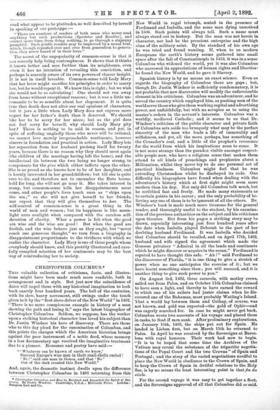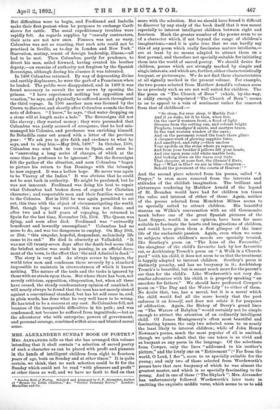CHRISTOPHER COLUMBUS.* Tins valuable collection of criticisms, facts, and illustra-
tions might have been made much more readable, both in
arrangement and in style. But just now the coincidence of dates will impel those with any historical imagination to look back exactly four hundred years. The bell of the centuries, with its slow, heavy movement, still swings under the touch given to it by the "first slave-driver of the New World " in 1492. 4‘ There is no more conspicuous example in history of a man showing the path and losing it," says the latest biographer of 'Christopher Columbus. Seldom, we suppose, has the worker upon a striking historical character less loved his subject than
Dr. Justin Windsor his hero of discovery. There are those who to this day plead for the canonisation of Columbus, and this points the charges which the American historian brings against the poor instrument of a noble deed, whose memory in a less documentary age received the imaginative treatment due to a pioneer. Romance and poetry have said:—
" Whatever can be known of earth we know,' Sneered Europe's wise men in their snail-shells curled ! ' No !' said one man in Genoa, and that 'No' Out of the dark created this New World."
And, again, the dramatic instinct dwells upon the difference between Christopher Columbus in 1493 returning from this
• Christopher Columbus, and How he Received and Imparted the Spirit of Dis- covery. By Justin Windsor. Cambridge, U.S.A. : Riverside Press. London : Sampan Low and Co.
New World in regal triumph, seated in the presence of Ferdinand and Isabella, and the same man dying unnoticed in 1506. Such points will always tell. Such a name must always stand out in history. But the man was not heroic in character, nor had he the prescient enterprise and the high aims of the military saint. By the standard of his own age he was tried and found wanting. If, when to us modern Europeans the earth's history seems gathered into small space after the fall of Constantinople in 1453, it was in a sense Columbus who widened the world, yet it was also Columbus who narrowed its appreciations of human rights and liberties: he found the New World, and he gave it Slavery.
Spanish history is by no means an exact science. Even as regards the biography of Columbus there are gaps ; but, though Dr. Justin Windsor is sufficiently condemnatory, it is not probable that new discoveries will modify the unfavourable element in his criticisms. Columbus was an adventurer, and he served the country which employed him, as pushing men of the world serve those who give them working capital and advertising power, not unfaithfully, but with no scruples as to using the master's orders in the servant's interests. Columbus was a worldly, medimval Catholic ; and it seems to us that Dr. Windsor's criticism of the public character and private faith of Columbus sets aside too brusquely what may be the perfect sincerity of the man who leads a life of immorality and selfishness, and yet, all the more perhaps, has something of the Crusader's zeal, and a little of the prophet's reverence for the world from which his inspirations seem to come. It is not more strange than the paradox visible amongst respect- able people now, who have a religious sense that makes them attend to all kinds of preachings and prophecies about a Millennium, whilst they never try to do one personal act of practical kindness. Columbus might feel that he was extending Christendom whilst he disobeyed its code. One difficulty his biographers have found when dealing with the adventurer's history which at first sight might seem more modern than his day. Not only did Columbus talk much, but he scribbled fast and freely. He made many statements as to certain points in his career ; and the only probability of be- lieving any one of them is to be ignorant of all the others. Dr. Windsor's book is made much more tiresome for the general reader, and thoroughly useful to the student, by his examina- tion of the previous authorities on the subject and his criticisms upon theories. But from his pages a striking story may be drawn, especially interesting just four hundred years after the date when Isabella played Deborah to the part of her doubting husband Ferdinand. It was Isabella who decided that Columbus should be recalled, and on April 17th, 1492, husband and wife signed the agreement which made the Genoese privateer "Admiral in all the lands and continents which he might discover or acquire in the ocean." Ferdinand is reputed to have thought this safe. " Ah ! " said Ferdinand to the discoverer of Florida, "it is one thing to give a stretch of power when no one anticipates the exercise of it; but we have learnt something since then ; you will succeed, and it is another thing to give such power to you."
On August 3rd, 1492, three caravels, with motley crews, sailed out from Palos, and on October 11th Columbus claimed to have seen a light, and thereby to have earned the reward to which one of his sailors had juster claims when he dis- covered one of the Bahamas, most probably Watling's Island. That a world lay between them and Cathay, of course, was not known, and gold was expected—the gold of Ophir—and was eagerly searched for. In case he might never get back, Columbus wrote two accounts of his voyage and placed them in casks, to float if men sank. After preliminary explorations, on January 10th, 1493, the ships put out for Spain. He landed in Lisbon first, but on March 15th he returned to Palos. In April he was received by the Sovereigns at Barc,e- lona with royal honours. Their work had now to begin. "It is to be hoped that some time the Archives of the Vatican may reveal the substance of the tripartite negotia- tions of the Papal Court and the two Crowns" of Spain and Portugal ; and the story of the varied negotiations needful to place the New World in obedience to the Crown of Spain, and to keep the Crown of Spain in dutiful relations to the Holy See, is by no means the least interesting point in that fin du siècle.
For the second voyage it was easy to get together a fleet, and the Sovereigns approved of all that Columbus did or said.. But difficulties were to begin, and Ferdinand and Isabella make their first protest when he proposes to exchange Carib slaves for cattle. The usual expeditionary troubles were rapidly felt. As regards supplies by "rascally contractors, their acts are not new ones. Fonseca was not so wary, Columbus was not so exacting, that such acts could not be practised in Seville, as to-day in London and New York." Starvation, mutiny, resent of foreign leadership, illness,—all had to be met. Then Columbus, partly for prudence, to divert his men, sailed forward, having created his brother deputy,—an exercise of authority not forgiven by the Spanish Sovereigns, although during his absence it was tolerated.
In 1496 Columbus returned. By way of deprecating divine and earthly displeasure, he wore the garb of a Franciscan when he landed. The public were disappointed, and in 1498 it was found necessary to recruit the new crews by opening the prisons. "I have experienced nothing but opposition and vexation," he says, and physically he suffered much throughout the third voyage. In 1500 another man was licensed by the Crown to discover, and shortly after Columbus sounds the first note of defence. "I know," he says, "that water dropping on a stone will at length make a hole." The Sovereigns did not like slavery; they wanted money ; they were persuaded that Columbus was justly accused of arrogance, that he had mis- managed his Colonies, and perchance was enriching himself. So Bobadilla came out armed with a letter of the previous year : "We ask you to give faith and credence to what he says, and to obey him.—May 26th, 1499." In October, 1500, Columbus was sent back in irons to Spain, and soon he is "answering a long series of charges, of which at the same time .he professes to be ignorant." But the Sovereigns felt the pathos of the situation, and soon Columbus "began to picture his return to San Domingo with the triumph he now enjoyed. It was a hollow hope. He never was again to be Viceroy of the Indies." It was obvious that he could not be sent back in authority. He might be pardoned, but he was not innocent. Ferdinand was doing his best to repair what Columbus had broken down of regard for Christian character; and respectable men and their families were sent to the Colonies. But in 1502 he was again permitted to set out, this time with the object of circumnavigating the world. But, though hope was revived, this was not done, and after two and a half years of voyaging, be returned to Spain for the last time, November 7th, 1504. The Queen was dying, and soon after died. Ferdinand was "outwardly beneficent and inwardly uncompliant." Columbus had no more to do, and was too dangerous to employ. On May 20th, or 21st, "this singular, hopeful, despondent, melancholy life came to its end." He died in obscurity at Valladolid. "It was not till twenty-seven days after the death-bed scene that the briefest notice was made in passing, in an official docu- ment of the town, to the effect that the said Admiral is dead."
The story is very sad. As always seems to happen, the world tries men and condemns them severely by a standard impossible to maintain in circumstances of which it knows nothing. The nature of the tools and the tasks is ignored by thosewith no strain upon them. But where there has been, not merely criticism, opposition, vituperation, but, when all these have ceased, the steady condemnatory opinion of mankind, it will nearly always be found that the man has not merely sinned against a conventional standard, but has let self come in, and, in plain words, has done what he very well knew to be wrong. He has tried to be a success at any cost. So Columbus fell, not because of the insuperable difficulties in his path ; and was condemned, not because he suffered from ingratitude,—but as the adventurer who with enterprise, powers of government, and personal courage, combined selfish aims and blunted moral sense.



































 Previous page
Previous page